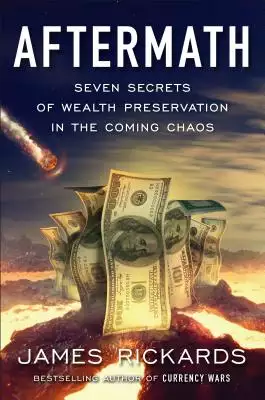u.s. stock market op的問題,透過圖書和論文來找解法和答案更準確安心。 我們找到下列股價、配息、目標價等股票新聞資訊
u.s. stock market op的問題,我們搜遍了碩博士論文和台灣出版的書籍,推薦Rickards, James寫的 Aftermath: Seven Secrets of Wealth Preservation in the Coming Chaos 可以從中找到所需的評價。
亞洲大學 經營管理學系 林佩冠、紀慧如所指導 何宣霈的 以動態能力之觀點探討企業如何對抗疫情 -以Uber、Lyft、Didi、Grab、Ola 為例 (2021),提出u.s. stock market op關鍵因素是什麼,來自於新冠肺炎、動態能力、動態環境、新常態、共享經濟。
而第二篇論文國立政治大學 國家發展研究所 劉曉鵬所指導 黃奕維的 清末以來中新關係的變遷:族群視角的分析 (2020),提出因為有 族群、中新關係、學習新加坡、中國夢、中華民族偉大復興的重點而找出了 u.s. stock market op的解答。
Aftermath: Seven Secrets of Wealth Preservation in the Coming Chaos

為了解決u.s. stock market op 的問題,作者Rickards, James 這樣論述:
A Wall Street Journal bestseller Financial expert, investment advisor and New York Times bestselling author James Rickards shows why and how global financial markets are being artificially inflated--and what smart investors can do to protect their assets What goes up, must come down. As any stude
nt of financial history knows, the dizzying heights of the stock market can't continue indefinitely--especially since asset prices have been artificially inflated by investor optimism around the Trump administration, ruinously low interest rates, and the infiltration of behavioral economics into our
financial lives. The elites are prepared, but what's the average investor to do? James Rickards, the author of the prescient books Currency Wars, The Death of Money, and The Road to Ruin, lays out the true risks to our financial system, and offers invaluable advice on how best to weather the storm.
You'll learn, for instance: * How behavioral economists prop up the market: Funds that administer 401(k)s use all kinds of tricks to make you invest more, inflating asset prices to unsustainable levels.* Why digital currencies like Bitcoin and Ethereum are best avoided. * Why passive investing has
been overhyped: The average investor has been scolded into passively managed index funds. But active investors will soon have a big advantage.* What the financial landscape will look like after the next crisis: it will not be an apocalypse, but it will be radically different. Those who forsee this l
andscape can prepare now to preserve wealth. Provocative, stirring, and full of counterintuitive advice, Aftermath is the book every smart investor will want to get their hands on--as soon as possible.
以動態能力之觀點探討企業如何對抗疫情 -以Uber、Lyft、Didi、Grab、Ola 為例
為了解決u.s. stock market op 的問題,作者何宣霈 這樣論述:
從2019 年爆發以來,新冠肺炎 (COVID-19)成為人類和經濟方面上最具破壞性的大傳染病之一。而企業必須從適合的理論及架構中調整商業策略,進而幫助企業在這種劇烈變化中生存下去。隨著世界適應新的封鎖(封城)生活型態並透過“社交距離”的執行,藉而避免病毒擴散,企業也被迫尋找新的收入方式,適應非接觸式經營模式,並隨時與顧客保持“密切”之關係,提供安全環境及體驗。在疫情危機時期,企業、政府及人民建立出信任和團結的新社會凝聚力及包容性勢必是實現雙贏的必要步驟。透過系統式回顧(Systematic Review) 以及動態能力(Dynamic Capabilities)之架構進行文獻回顧,本論文分
析532篇有關以上5大共享汽車業者 (Uber、Lyft、滴滴、Ola 和 Grab) 這5大知名共享汽車和電子召車公司,之報導及文章,導論出“6S 子架構”(6S Sub-constructs),包含1-安全(SAFETY),2-掃描(SCAN),3-系統(SYSTEM),4-支援(SUPPORT), 5-擴散(SPREAD),6-速度(SPEED)。透過 6S 子結構和我們的研究結果,本論文也提出有關共享經濟領域的企業在動態環境成為新常態的情況下,該如何調整管理和行銷策略:1-提供安全和無病毒的行車體驗,在新常態下的汽車共享業務將是首要任務。2-利用各種技術創新來降低風險,例如使用即時人臉
識別掃描來檢測駕駛員和乘客是否戴口罩,以及與政府和足跡追踪系統合作,都是提高安全性的另一種方式。3-通過金融/保險援助來調整企業文化/結構,或提供免費或打折的疫苗接種點乘車服務,來支援社區安全,並同時保護自己的車隊人員,來為所有利害關係人提供心理上之安心。4-隨著非接觸式送貨的需求激增,在大流行期間或之後擴展相關新服務或業務,是產生更多收入的必要策略。5-企業應持續應用 SAFETY、SCAN、SYSTEM、SUPPORT 和 SPREAD 的子結構,將抗擊疫情作為新常態。
清末以來中新關係的變遷:族群視角的分析
為了解決u.s. stock market op 的問題,作者黃奕維 這樣論述:
從族群的角度探討中新關係,是學界長期忽略的觀點。本研究以後殖民理論的相關論點切入,從近代中國受到西方影響的種族觀之角度分析,認為新加坡在近代以來,成為黃種人希望更像「白人」,並證明華人、東方優越性的投射地。上述心理也影響了近代的中新關係,然而近年在中國推動「中國夢」、「中華民族偉大復興」後,新加坡高等華人、中國發展導師的地位逐漸喪失,中國拿回了華人優越性的話語權,連帶造成了中新關係的變化。